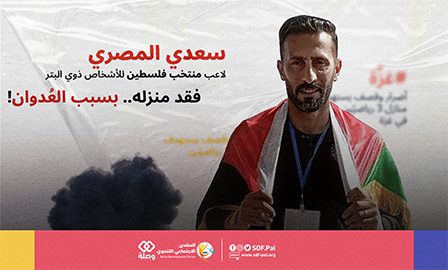Difficulties People with disabilities face in emergencies

“You have only 10 minutes to evacuate.. we will bomb the house.”
10 minutes to inform your wife and your family members of this shocking alarm, 10 minutes during which you will run to bring your children, and to fetch the most important properties and document you have: identity documents, money, clothes, and maybe have your last look at your house that you will miss forever. Then, to rapidly make sure that your all family members have safely evacuated to finally escape together away from home!
Despite the difficulty of even imagining such a situation, it is way harder to happen to a person with a disability!
Saadi Muhammad Al-Masri (37 years), a team player of the national Palestinian amputees’ soccer team and a father of four children who lives in Beit Lahia city, northwest of the Gaza Strip, has experienced, along with his family a serious full sense of a “nightmare”, during the Israeli aggression on the Gaza Strip in May 2023, when he received a call from the Israeli occupation army asking him to evacuate the entire building in 10 minutes, in preparation for bombing it with war missiles!
“The building consists of two floors, each floor contains four apartments, where twenty people habitat including children, women, and men. What can I do in 10 minutes? How will I save myself, my wife, my children, and my family members? It was even harder than a “nightmare” is. My family and I have experienced a serious terror.” Saadi says.
Despite the difficulty of retrieving the situation, Saadi shared with us the hardest feeling he has experienced, which is the doubled difficulty he faced during the evacuation process, being a person with a physical disability. Saadi had an amputation above the knee of his left foot. He says, “I tried to leave the house as fast as possible, but it was tough, as I need to use a wheelchair. Where everyone around me was trying to provide a hand to facilitate the difficulty of movement. So, I had been screaming to urge my children as well as my family members to leave the house before being bombed over our heads.”
Along with his family, a few steps away from the building were not enough to catch their breath, their house was bombed with a “warning” missile – fired from a drone – followed -five minutes later- by an F16 missile that has completely demolished the building. Saadi summarizes the narration of the situation, with sluggish words, and an agony revealed through his deeply pained voice tone over the phone interview. “In an instant…few seconds… were enough to turn my home into ashes.
The Israeli occupation’s forces launched military aggression against the Gaza Strip on the evening of May 9, 2023, and it is still ongoing as of the time of writing this article. The Palestinian Ministry of Health stated that 33 Palestinian were killed, including a person with a disability and two elderly people. In addition, 147 civilian citizens have been injured, including 3 elderly people and a wounded woman who was paralyzed and became disabled.
Saadi has explained to us the suffering status of PWDs. For instance, in the evacuation process during emergencies and crises. He says: “10 minutes are not sufficient for a person with a disability to evacuate from his home safely and soundly (without being injured), as well as being able to get our all crucial documents and properties, especially those related to disability, such as medicines and accessibility devices”.
Saadi proceeds his speech, to further explain the specificity of the evacuation process for PWDs by pointing out that in addition to the difficulty in movement, a PWD suffering from paralysis has an ongoing need of using a wheelchair or a urine bag. They need adequate time to be evacuated to a safe place without being injured or suffering from complications to their health due to the inconvenient consequences of the evacuation.
After the destruction of his house, Saadi is currently living in a house of a relative. He expresses his temporary residency status by saying: “another chapter of suffering has just started! There are no designated sanctuaries in the Gaza Strip that PWDs may use during such an urgent situation. As relative’s houses are not likely to be accessible and adaptable. Besides, Saadi says:
“Fortunately, I left my home safely…but currently I live in an adapted house; I’m not convenient to independently move and get my things done easily, which even makes the matter of using the toilet way difficult, and may expose me to fall or exposed to injury.”
Saadi Al-Masri, the Palestinian swimming champion, national Palestinian amputees soccer team player, and player of the sitting-basketball team left these remarkable achievements buried under the rubble of his destroyed house. He appealed to the international community and human rights institutions to provide special protection for people with disabilities during times of emergency. Most importantly, setting evacuation plans in advance, taking into consideration providing accessible sanctuaries for PWDs in the Gaza Strip.”
It is worth mentioning that people with disabilities compromise nearly 7% of the total population of the Gaza Strip, who have been facing several challenges related to health care, public services, and transportation. This becomes way harder during emergencies, especially in light of the humanitarian crises caused by the Israeli occupation, the repercussions of its repeated military attacks, and the illegal policies of its blockade of the Gaza Strip.

